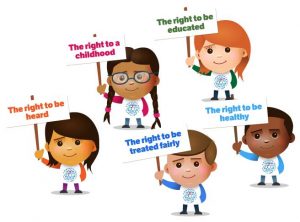Who is a ‘child’?
A child is defined by the United Nations Convention on the Rights of the Child (UNCRC), as anyone under the age of 18years unless the age is set earlier by laws applicable to the child. For example, in Nigeria, the age of maturity is set at 16 years in some states for various reasons, most notable of which is marriage. A ‘Right’ is what is morally just regarding an action or a situation. It describes the moral or legal entitlement to ‘have’ or to ‘be’. So, seeing as a child is human, they also have a right to ‘be’ and to ‘have’, among other things.
 A child’s rights are their legal entitlement to survive, thrive and meet their full potential. It applies to every child around the world regardless of culture, religion, or even physical attributes, and should not be taken away. Even though these legal entitlements are there to protect children, it is still scorned in some populations, partly because it is perceived as an imposition from the ‘West’ that encourages it’s people to stray away from cultural and religious norms.
A child’s rights are their legal entitlement to survive, thrive and meet their full potential. It applies to every child around the world regardless of culture, religion, or even physical attributes, and should not be taken away. Even though these legal entitlements are there to protect children, it is still scorned in some populations, partly because it is perceived as an imposition from the ‘West’ that encourages it’s people to stray away from cultural and religious norms.
 The (Nigerian) Child’s Rights Act
The (Nigerian) Child’s Rights Act
In Nigeria, the Child’s Rights Act was adopted in September 2003, although till date not all states have passed the Child’s Rights Act into law. All states are expected to domesticate the Act into state laws and also amend the state laws that are antagonistic to the Act and Child Rights Convention.
The Child’s Rights Act considers the girl child, the less privileged, street children, and mentally or disabled children. It also recognizes the right of the Nigerian child to justice, parental responsibility, rest, etc.
Despite the Child’s Right Act being in place, it is still largely disrespected and violated. If you have ever wondered why violations of the Child’s Rights Act in some Nigerian States goes unprosecuted, it is likely because the Act is not binding in those states. As mentioned earlier, each state in Nigeria is expected to domesticate the Act according to the Constitution and if this does not happen, the Act will not be unbreakable in that state. And if the Act is unbreakable in such state then no court can prosecute violations on the Child’s Rights Act there because they have not passed it into law.
 The Rights of a (Nigerian) child
The Rights of a (Nigerian) child
A child (in Nigeria) has the right to;
- Be born, to have a name and nationality.
- Have good shelter and a loving family that will care them.
- Eat nutritious food to have a healthy and energetic body.
- Have enough education to develop their skill and talents.
- Play and have enjoyment with their friends.
- Have enjoyment with their friends.
- Live in a peaceful and child-friendly environment.
- Be protected and helped by government.
- Express their own views, opinions, thought and ideas.
- Participate in youthful activities and progressive meetings.
Culture and Religion have played a huge role in why the aforementioned states have not passed the rights into law. Access to education in these parts is also guarded especially where it concerns the female child, perhaps because it is considered injurious to the beliefs they hold dear. So, what do we do as parents and guardians to protect and preserve our children’s rights?
So, what do we do as parents and guardians to protect and preserve our children’s rights?
Brighten the corner where you are. Even though the implementation of these rights leans largely on legislators, we can still do what we can with what we have. Seek knowledge and educate the people around you. Know what your child’s rights are and teach them the same. Encourage them to be aware of their rights and also demand them when their rights are being violated.

Dr Omowunmi H. Thanni is a physician with a medical degree from Olabisi Onabanjo University Ago-Iwoye (Mb.ChB. Ogun). She is an Infant and Childhood Mental Health enthusiast who is passionate about supporting children with mental health concerns.
She is also an Early Childcare practitioner with experience observing children dealing with grief, the various psychosocial presentations, and the impact on their families. She is also a Child and Family Volunteer who serves as a healthy support system for children and families who have experienced the loss of one or both parents to terminal illnesses.
She is devoted to debunking cultural myths surrounding childhood mental health and enlightening the community on proper prevention and intervention strategies.

